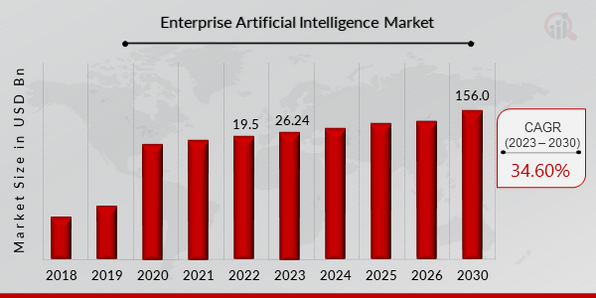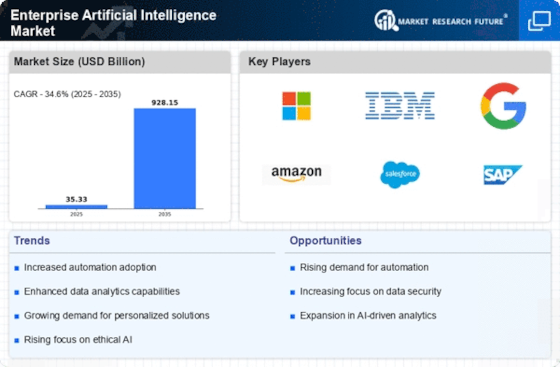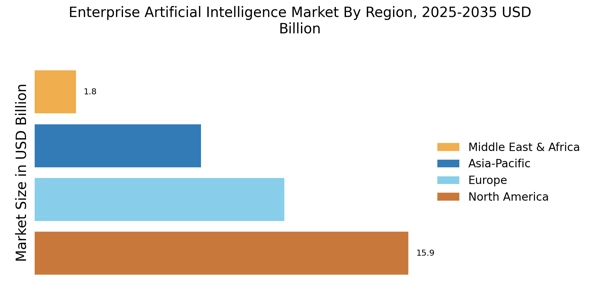Rising Demand for Automation
The Enterprise Artificial Intelligence Market experiences a notable surge in demand for automation across various sectors. Organizations are increasingly adopting AI technologies to streamline operations, enhance productivity, and reduce operational costs. According to recent data, the automation market is projected to reach USD 200 billion by 2025, indicating a robust growth trajectory. This trend is driven by the need for efficiency and the ability to process vast amounts of data quickly. As businesses seek to remain competitive, the integration of AI solutions becomes essential, thereby propelling the Enterprise Artificial Intelligence Market forward. The automation of routine tasks allows human resources to focus on more strategic initiatives, further driving the adoption of AI technologies.
Growing Need for Data Analytics
The Enterprise Artificial Intelligence Market is propelled by the growing need for data analytics across various industries. Organizations are inundated with vast amounts of data, and the ability to analyze this data effectively is crucial for informed decision-making. The data analytics market is projected to reach USD 274 billion by 2022, highlighting the increasing importance of data-driven strategies. AI technologies facilitate advanced analytics, allowing businesses to uncover patterns, trends, and insights that were previously unattainable. This capability not only enhances operational efficiency but also fosters innovation within organizations. As the demand for data analytics continues to rise, the Enterprise Artificial Intelligence Market is likely to expand, driven by the need for actionable insights.
Increased Focus on Customer Experience
The Enterprise Artificial Intelligence Market is increasingly shaped by the focus on enhancing customer experience. Organizations are recognizing that personalized interactions can significantly impact customer satisfaction and loyalty. AI technologies enable businesses to analyze customer behavior, preferences, and feedback, allowing for tailored solutions and services. The market for AI-driven customer experience solutions is expected to grow substantially, with estimates suggesting a value of USD 20 billion by 2025. This emphasis on customer-centric strategies is driving the adoption of AI technologies, as companies seek to differentiate themselves in competitive markets. As customer expectations evolve, the Enterprise Artificial Intelligence Market is likely to adapt, fostering innovation in AI applications.
Regulatory Compliance and Risk Management
The Enterprise Artificial Intelligence Market is influenced by the increasing emphasis on regulatory compliance and risk management. Organizations are under pressure to adhere to various regulations, and AI technologies can assist in monitoring compliance and mitigating risks. The market for compliance solutions is projected to grow significantly, with AI playing a crucial role in automating compliance processes. By leveraging AI, businesses can enhance their ability to identify potential risks and ensure adherence to regulatory standards. This trend not only supports operational integrity but also fosters trust among stakeholders. As regulatory landscapes evolve, the Enterprise Artificial Intelligence Market is likely to see a rise in demand for AI-driven compliance solutions.
Advancements in Machine Learning Algorithms
The Enterprise Artificial Intelligence Market is significantly influenced by advancements in machine learning algorithms. These innovations enhance the capabilities of AI systems, enabling them to learn from data and improve over time. The market for machine learning is expected to grow at a compound annual growth rate of 43% from 2020 to 2027, reflecting the increasing reliance on sophisticated algorithms. Organizations are leveraging these advancements to gain insights from data, optimize decision-making processes, and personalize customer experiences. As machine learning continues to evolve, it is likely to play a pivotal role in shaping the future of the Enterprise Artificial Intelligence Market, driving further investment and development in AI technologies.

















